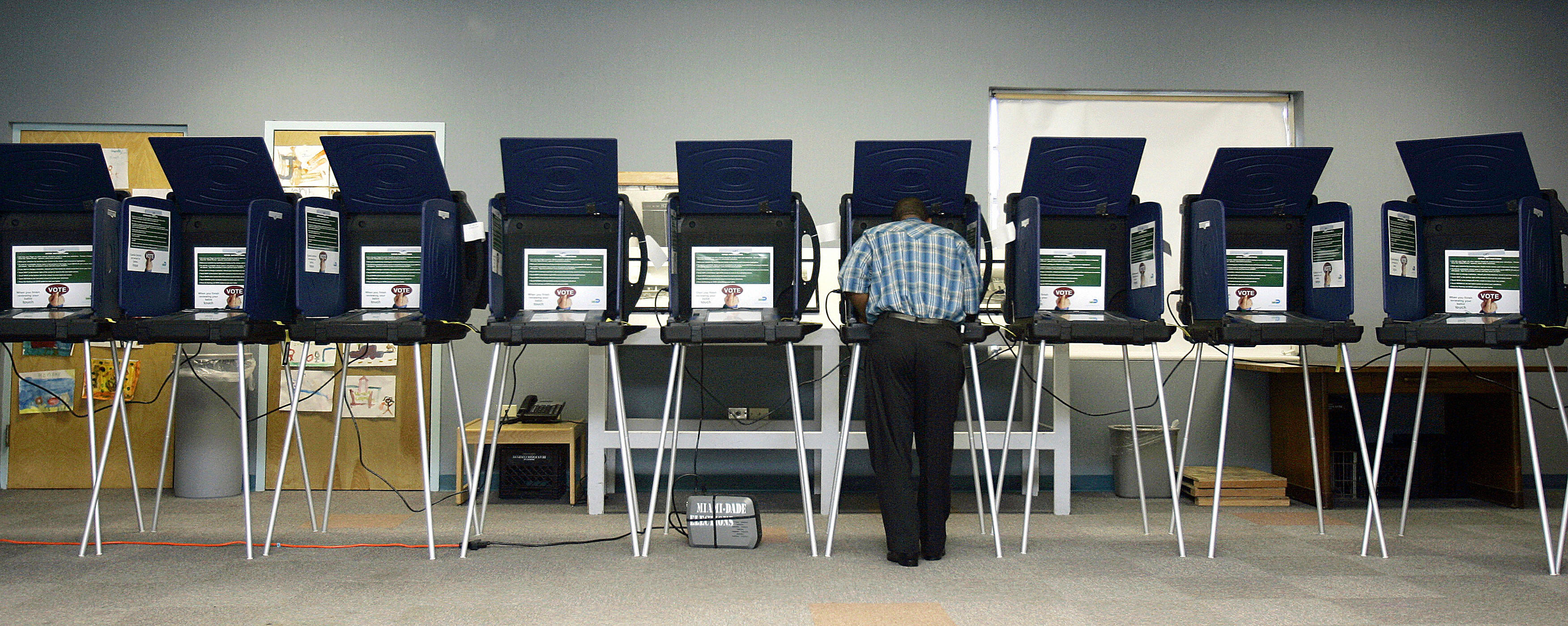Democrats are still obsessed with Jill Stein. They should start obsessing over nonvoters instead.
Millions of Americans didn't vote last year — and no one cares


A free daily email with the biggest news stories of the day – and the best features from TheWeek.com
You are now subscribed
Your newsletter sign-up was successful
In early June, Green Party presidential candidate Jill Stein took to Twitter to lament President Trump's decision to withdraw the United States from the Paris climate accord. "It's largely your fault, you imbecile," Keith Olbermann responded in full view of his nearly one million followers — nearly four times the number of users who follow Jill Stein on the platform.
It was a neat illustration of the Stein paradox. The Green Party is a gadfly that buzzes by every four years, while the Democratic Party is a hulking semi-state institution whose priorities and indifferences delimit the nation's political agenda. Despite this obvious imbalance, Democratic Party loyalists peer down from the seat of power and condemn the relatively inconsequential Stein as a devastating spoiler. Their logic is unspoken but transparent: Every vote for Stein in 2016 was in effect stolen from the Democrats.
There are two categories of non-two-party votes in the contemporary American political climate, and they're regarded differently. The first is the third-party vote, which, especially on the left side of the aisle, is considered burglary. The second is total abstention, which is considered inevitable, and therefore hardly factors into the mainstream media's election postmortems. In neither scenario does the losing major party (in this case the Democrats) take responsibility for failing to move potential voters to act on its behalf.
The Week
Escape your echo chamber. Get the facts behind the news, plus analysis from multiple perspectives.

Sign up for The Week's Free Newsletters
From our morning news briefing to a weekly Good News Newsletter, get the best of The Week delivered directly to your inbox.
From our morning news briefing to a weekly Good News Newsletter, get the best of The Week delivered directly to your inbox.
"But," you may protest, "Donald Trump won by a margin smaller than the number of Green Party votes in key states, particularly the Upper Midwest!" And you're right, that's true. Take Michigan: Trump won Michigan by 13,225 votes, while Jill Stein walked away with 51,463 votes. Clearly, if all of those people had voted for Hillary Clinton instead of Stein, Clinton would have won Michigan. (Whether Stein votes ought to be otherwise considered shoo-in Democrat votes is a separate matter.)
If these are the only variables of interest to us — the number of ballots affirmatively cast for Trump, Clinton, Stein, and maybe Johnson — then yeah, the Stein-as-spoiler argument makes some sense. But here's another number, one that ought to change your perspective: 87,810. That's how many Michigan voters showed up to the polls, cast ballots, and declined to vote for a presidential candidate at all.
That compares to 49,840 such "undervotes" in 2012. It was a veritable phenomenon last year — people stood in line and performed their civic duty, but simply abstained from marking a preference for commander in chief. An analysis published by The Washington Post tallied 1.7 million undervotes in 33 states. The number was up in most states, they concluded, by an average of 2.5 times as much as in 2012.
In a few states, the undervote total was larger than the margin of victory. Those states were Michigan, Maine, Florida, and Arizona — swing states all. And what is an undervote but an intentional expression of distaste for the prospects on offer? Apparently these voters found the presidential choices too unappetizing for even a clothespin vote.
A free daily email with the biggest news stories of the day – and the best features from TheWeek.com
In Michigan, the 2016 undervote was sizably larger than the Stein vote, and dwarfed Trump's margin of victory. Many of those voters may have been Republicans protesting their nominee, but many were undoubtedly Democrats, too. Plus, it wouldn't have taken much to change the election; if even one-seventh of the total number had decided to vote for Clinton instead of abstain, she would've beaten Trump in the state. The deciding factor in Michigan wasn't a vote for Stein any more than it was a vote for nobody.
Of course, the undervoters weren't the only people in Michigan who voted for nobody. Nearly three million Michiganders joined the roughly 40 percent of eligible American adults who declined to vote at all last year. In Michigan, those eligible nonvoters were 200 times larger than Trump's margin of victory.
Let me rephrase that: If only 0.5 percent of eligible nonvoters in the state had turned out for the Democratic candidate last year, Clinton would have won Michigan.
The final turnout, in Michigan and across the board, wasn't particularly low compared to previous elections. This indicates that eligible nonvoters weren't kept at bay due to uniquely unappealing candidates (as the high undervote total suggests Trump and Clinton were). Nor were they kept home by voter suppression — the only reports of voter suppression in Michigan took the form of people being improperly turned away from the polls, and while there's no hard data on the number affected, you can bet it wasn't a significant fraction of three million.
Most nonvoters aren't victims of impossible and prejudicial ID laws. Nonvoters are primarily kept out of the booth by a softer form of voter suppression: pervasive lifelong alienation from the political process.
These are people who routinely act out of self-interest: They look both ways before crossing the street and delete their exes' numbers from their phones to prevent imprudent drunk dials. It cannot be that all of them are irrational actors or anomalous thinkers. It must be that, as a group, they don't equate voting with acting in their own self-interest. Why?
According to the Pew Research Center, nonvoters are twice as likely to be people of color than voters are, and more than twice as likely to have a family income under $30,000. Most nonvoters have not attended any college. Almost half say they've had trouble paying their bills in the last year. Only half of them report having a credit card. Ditto a savings account. They're twice as likely to say they borrow money from family and friends.
Nonvoters are far less likely to identify with one of the major parties. And who can blame them? While it's unfair and ill-advised to completely elide the differences between Democrats and Republicans, the fact remains that neither party has a proven track record of robustly demanding and taking consistent steps to ensure that everyone is paid a living wage, has access to health care, has quality public education — even where the provision of those basic goods and services contravenes corporate or donor-class interests. The top 10 percent of American earners are evenly split between Democratic and Republican affiliation, which wouldn't be the case without a shared (which is not to say equal or identical) commitment to resisting wealth redistribution.
Without a functional safety net, poor and working-class people have a hard time in America, and neither party is truly committed to fixing that. Republicans have traditionally explained it away as a direct function of insufficient talent, stupid or pathological lifestyle choices, and/or poor work ethic — a social Darwinist consequence of innate defectiveness or a theological punishment for sloth. Democratic politicians, for their part, love to propose labyrinthine public-private solutions that sound great to their class peers, who are uniformly dazzled by public policy jargon, but don't always (or even often) deliver the goods.
The only reason the miniscule Stein vote totals matter to anyone is that, deep down, they take the political inactivity of poor people — especially poor people of color — for granted. Otherwise, a number like 51,463 in Michigan (or 31,006 in Wisconsin, also larger than Trump's margin of victory) wouldn't stand out as the straw that broke the camel's back. Put in proper perspective, it would be understood as a tiny and highly atypical expression of a much larger phenomenon of estrangement from the two-party system.
The fixation on the third-party vote is a decoy. Worse, it's a fundamental miscalculation, especially for Democrats, who have a slightly better chance than Republicans of activating this dormant electorate. Or at least they could if they were willing to make material concessions to poor people of color at the expense of the donor class.
"Trump's victory margin smaller than total Stein votes in key swing states," carped a headline at The Hill in 2016, one of dozens or hundreds like it. But where are the headlines that read, "Trump's margin of victory dwarfed by the number of poor nonvoters in key swing states"? That's the conversation we need to be having. Not which weight tipped the scale, but why the scale only holds half the weights to begin with.
Meagan Day is a journalist covering politics. She was a Ben Bagdikian Editorial Fellow at Mother Jones magazine. Her debut Maximum Sunlight was chosen for The Best American Nonrequired Reading 2017.
